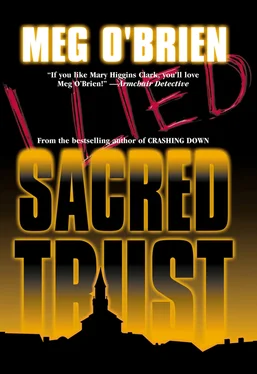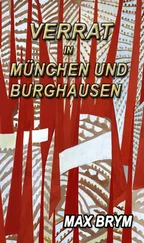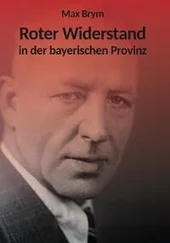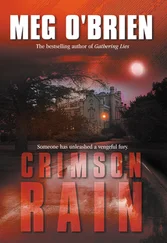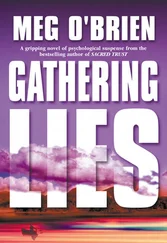There was time for only one thing in those final moments. Marti, still bound, was able to roll herself onto her side. From that position she used the fingers of one hand to write in the dirt. She prayed the darkness would cover the word, that it wouldn’t be seen until the police arrived.
She prayed for other things, too. For the souls of her dead mother and father, for her own soul, for those of her friends. She prayed for the child she had given up so many years before. And when her killer dragged her to the makeshift cross and lashed her to it with rags so tight they cut into her skin, when it dawned on her what he planned to do, she even found it in the long-lost depths of her soul to pray for the person who was doing this hideous deed.
Finally, as the nails punctured her palms, the prayer she screamed silently into the gag became, Mary, mother of God, save me. Please, oh, please, Mary, save me.
But even as Marti prayed, she knew it was far too late for that. The mother of God didn’t come around much anymore.
Nobody believes me now when I tell them that I, Abby Northrup, of all people, used to be a nun. They look at my Better Homes and Gardens house, the “perfect” marriage I had before Jeffrey screwed me over—or, more precisely, screwed that bimbo over—and they laugh.
But it’s true. I used to be a nun. Oh, I was only seventeen when I entered, and I never took vows. When I left the order at eighteen, people asked me why. Trying to be funny, I said, “I decided I liked boys more than girls.” That was true, too. But only half the truth. Because at Joseph and Mary Mother-house, at eighteen, I loved Marti Bright more than anything in life.
Marti was one of those eighteen-year-old women who seemed ageless. She might have lived a lifetime before she was five. She was kind and funny, generous and giving. She spent hours in the motherhouse chapel, praying till her knees were scarred. Her face was peachy, like the cliché, and her eyes huge and dark. She had a musky scent that I loved and later identified as Pacquin’s hand lotion, and there was such an aura about Marti Bright, we gave her the nickname “Shining Bright.” In later years, after we both left the convent— “leapt over the wall,” as they said in those days—Marti became a photojournalist, and the nickname stuck: Shining Bright.
They called her that on the news this morning, when the best friend I ever had was found crucified on a hill in Carmel. The newsperson droned unthinkable words over the car radio as I drove recklessly to get to Marti, shock and horror vying for room in my heart. “A world-renowned photojournalist, Marti Bright would forget, in third-world countries, that she was there on assignment. Several times her cameras disappeared while she fed rice and water to starving children. Dave Arnott, you knew her. Tell us something about this woman they called Shining Bright.”
A male voice had taken over, heavy with sadness. “Marti was more than beautiful. She had a beautiful soul. More than once she was found crouching in the dirt, her khakis covered with mud. ‘Cameras can be replaced,’ she once told this reporter, ‘but not the grasp of a child’s fingers on yours as you siphon the tiniest drops of water or food into a starving mouth. Not that particular moment, or that particular child…’” Arnott’s voice had trailed off, and the first newsperson had finished simply, “Marti Bright will be sorely missed.”
I stand looking at my old friend now, her naked torso swinging slightly in a brisk wind, exposed for half the town to see. Her wrists have been bound to the makeshift cross with some kind of cloth, and there are large, thick nails through her palms. Her beautiful dark hair has been cut as if with a blunt knife; its ragged edges are plastered to her skull by the rain. Blood is pouring down. There are bruises everywhere, and odd, peppery cuts all over her abdomen and breasts. From this angle I cannot see how her back has been stripped of flesh, though I’ve been told this is the case.
The worst of it, however—the absolute worst—are the words “I LIED” painted garishly in red across her chest.
Soon the national media will be here, but for now the stringers push forward for close-ups—not for the local television stations or papers, which might have the taste not to show them, but for Hard Copy, the Inquirer, and that ilk. Even an old Cesarean scar is hot news, the faint, smooth line from belly to pubic hair glistening beneath pelting rain and the storm-darkened sky. Till now, no one in the press has known that Marti had a child, nor has her family, or most of her friends. She never married, never seemed interested in a family, only her work.
I knew, however. I was there by Marti’s side fifteen years ago, I saw the child lifted from her womb. I stood holding her hand, tears streaming down my cheeks along with hers. There was a time when Marti kept no secrets from me.
That has changed of late. It must have, I think, staring numbly at my friend before the sheriff’s investigators cut her down. With the incessant click click click of cameras all about me, I think that something major must have changed. Because of all the secrets Marti told me over the years, she never once told me who in the name of God might have hated her so much, they could have done such a God-less thing.
The cross upon which Marti’s thin, battered body was nailed and strung is planted deep into rain-softened ground above the Carmelite monastery, not five minutes from my house. This side of the hill is bare of trees, and on a good day I might have been ambling along Highway 1, on my way to breakfast at Rocky Point, and seen her here. Until the rain began, however, the fog was heavy in Carmel, visibility less than a block or so either way.
I struggle to keep my composure as they lay my best friend on a sheet of black plastic in the cold rain, the medical examiner poking and prodding into places she never would have allowed him to touch if alive. As if to escape the ugly scene, my mind swoops back, way back, and I wonder how it is that such things come to be. There we were twenty years ago, Marti and me, two women with high hopes, thinking we could do anything, go anywhere, and that even if one day we became old women pushing walkers around in a nursing home, we would at least have bright, golden memories to warm us till the day we died.
I don’t know what happened to Marti’s dream. But was it my fault, I wonder, the death of my dreams? Did I cling too much to the past? Was there something in me that wished to be back in that time when love seemed so pure, so good, rather than the way it was with Jeffrey?
Even now, months later, it sickens me to remember the way I found my husband with that bimbo on the sheets I had only that morning laundered, her breasts dangling over his chest, him gobbling them up like a starving orphan while that poor pitiful part of him that, to my knowledge, hadn’t functioned for weeks, stood ramrod straight, poking into every opening in a way I’d long since tired of it poking into me.
By then my marriage had come down to doing other things that pleased Jeffrey, like adding Bounce to the dry cycle so the sheets wouldn’t scratch his sensitive skin. If I’d known what he was doing with her while I was at the office struggling to come up with a witty new column, I’d have dumped a bottle of Drano into the wash.
Damn Viagra, anyway. That’s what started the whole thing.
Not that I really cared. I’d given up loving Jeffrey long before, and who can blame him for seeking solace in the hills, even if those hills were made of boundless pasty-white flesh?
So, yes, I caught the dream, then threw it away. But wouldn’t you know, there are still the damned penances to pay. Not Hail Marys nor Our Fathers, as in the past. That would be too easy an out. For my penance I have the fact that, even though Jeffrey is still around, still sleeps on a couch in the house to keep the rumormongers at bay, there is another memory now, one less warming to take into that time when I’m shuffling along a cold corridor with people who wear bibs and shout for help, though they know not where they are.
Читать дальше
